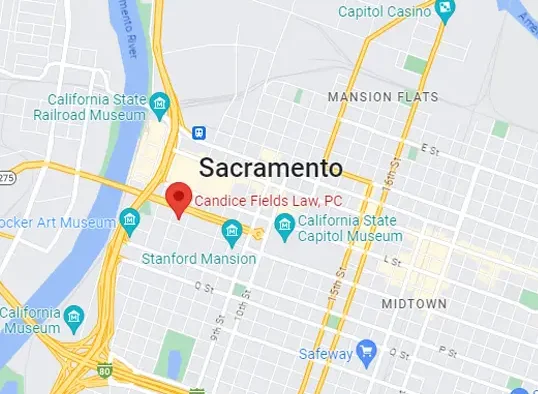California Environmental Defense Lawyer
At Candice Fields Law, PC in Sacramento, we provide comprehensive environmental law services to clients throughout California. Our practice focuses on helping businesses, organizations, and individuals navigate the complex landscape of environmental regulations while promoting sustainable practices and responsible development. Contact Candice Fields Law, PC in Sacramento to schedule a confidential consultation and learn how we can help safeguard your future.
How a California Environmental Defense Lawyer Can Help Protect Your Rights

At Candice Fields Law, PC, we understand that facing environmental criminal charges can be overwhelming. As your California environmental lawyer, we provide strategic criminal defense against allegations of environmental violations. Here's how we protect your rights:
- Criminal Investigation Defense: Our California environmental lawyers step in early during investigations by environmental agencies, protecting your rights and managing interactions with investigators to prevent self-incrimination.
- Search Warrant Response: We ensure that environmental investigators and law enforcement properly execute search warrants and help you understand your rights during facility inspections and document seizures.
- Grand Jury Representation: Our California environmental attorneys guide clients through grand jury proceedings, preparing testimony and protecting against potential criminal indictments for environmental violations.
- Clean Water Act Defense: We defend against criminal charges involving alleged water pollution violations, including unauthorized discharges, false reporting, and tampering with monitoring devices.
- Clean Air Act Criminal Defense: Our team handles defense against criminal air quality violations, including allegations of emissions tampering, false reporting, and operation without required permits.
- Hazardous Waste Defense: We represent clients facing criminal charges under RCRA and California hazardous waste laws, addressing allegations of illegal disposal, transportation, and storage.
- Individual Criminal Liability: Our California environmental lawyers defend corporate officers, managers, and employees facing personal criminal liability for environmental violations in their professional roles.
- Emergency Response Representation: We provide immediate legal support following environmental incidents that may lead to criminal charges, guiding proper response actions and documentation.
- Parallel Proceedings Management: Our team coordinates defense strategy when clients face both criminal charges and civil enforcement actions for environmental violations.
- Compliance Program Development: We help create robust environmental compliance programs that can serve as evidence of good faith efforts to comply with environmental laws.
- Plea Negotiation Strategy: Our California environmental attorneys negotiate with prosecutors to minimize criminal exposure, often seeking civil resolutions or reduced charges where appropriate.
- Sentencing Mitigation: We develop comprehensive sentencing presentations highlighting compliance efforts, remediation actions, and other mitigating factors to seek reduced penalties.
- Internal Investigation Guidance: Our team helps companies conduct internal investigations of potential environmental violations while preserving legal privileges and protecting against self-incrimination.
- Documentation Defense: We challenge prosecution evidence, including environmental testing results, chain of custody issues, and sampling procedures that may not meet legal standards.
California Environmental Cases We Take
At Candice Fields Law, PC, our California environmental lawyers handle a wide range of environmental cases throughout the state. From criminal defense to civil litigation, we provide comprehensive legal representation in environmental matters. Here are the types of cases we handle:
- Criminal Environmental Defense: We defend individuals and businesses facing criminal charges for alleged environmental violations, including water pollution, air quality violations, and hazardous waste disposal infractions.
- CEQA Compliance Cases: Our California environmental attorneys represent clients in California Environmental Quality Act matters, including challenges to environmental impact reports and defending against project opposition.
- Water Rights Disputes: We handle cases involving water rights allocation, unauthorized water diversion claims, groundwater management disputes, and Clean Water Act violation defense.
- Hazardous Waste Litigation: Our team manages cases involving hazardous waste storage, transportation, disposal violations, and defends against allegations of improper handling of dangerous materials.
- Air Quality Violation Defense: We represent clients facing enforcement actions for air quality violations, including cases involving emissions standards, permitting issues, and reporting requirements.
- Land Use Conflicts: Our California environmental lawyers tackle cases involving zoning disputes, development restrictions, wetlands regulations, and conflicts between property rights and environmental protection.
- Environmental Property Damage: We handle cases involving contamination of property, including soil and groundwater contamination, toxic spills, and regulatory cleanup requirements.
- Endangered Species Act Cases: Our team manages cases involving protected species habitat, development restrictions, and compliance with federal and state endangered species regulations.
- Underground Storage Tank Issues: We represent clients in cases involving leaking underground storage tanks, including cleanup obligations, regulatory compliance, and third-party liability claims.
- Toxic Tort Defense: Our California environmental attorneys defend against claims of personal injury or property damage from alleged exposure to hazardous substances or environmental contamination.
- Environmental Insurance Claims: We handle cases involving environmental insurance coverage disputes, including claims for cleanup costs and pollution liability coverage.
- Regulatory Enforcement Defense: We defend clients against enforcement actions by state and federal environmental agencies, including cases involving permits, reporting requirements, and compliance orders.
- Cost Recovery Actions: Our team pursues and defends cases involving the recovery of environmental cleanup costs under both federal and California state law.
- Administrative Hearings: We represent clients in administrative proceedings before environmental agencies, including permit appeals, variance requests, and enforcement hearings.
- Environmental Whistleblower Cases: Our California environmental lawyers handle cases involving environmental whistleblower claims, both defending against false claims and protecting legitimate whistleblowers.
Key California Environmental Laws and Regulations
At Candice Fields Law, PC, we help clients navigate California's complex environmental legal framework. Here are the key laws and regulations that shape environmental protection in our state:
California Environmental Quality Act (CEQA)
CEQA serves as California's fundamental environmental law. Public Resources Code § 21000 states the legislative intent: "It is the policy of the state that projects to be carried out by public agencies be subject to the same level of review and consideration of environmental protection as private projects required to be approved by public agencies."
The law requires state and local agencies to:
"Identify the significant environmental impacts of their actions and to avoid or mitigate those impacts, if feasible" (Public Resources Code § 21002).
Furthermore, CEQA Guidelines § 15002(a) specifies three basic purposes: "(1) Inform governmental decision makers and the public about the potential environmental effects of proposed activities. (2) Identify ways that environmental damage can be avoided or significantly reduced. (3) Prevent significant, avoidable damage to the environment by requiring changes in projects through the use of alternatives or mitigation measures when the governmental agency finds the changes to be feasible."
Porter-Cologne Water Quality Control Act
This cornerstone of California water law, found in Water Code § 13000, declares:
"The Legislature finds and declares that the people of the state have a primary interest in the conservation, control, and utilization of the water resources of the state, and that the quality of all the waters of the state shall be protected for use and enjoyment by the people of the state."
The Act establishes nine Regional Water Quality Control Boards, with Water Code § 13225 empowering them to: "Require as necessary any state or local agency to investigate and report on any technical factors involved in water quality control or to obtain and submit analyses of water."
California Clean Air Act
Health and Safety Code § 39607 requires the California Air Resources Board to:
"Adopt standards of ambient air quality for each air basin in consideration of the public health, safety, and welfare, including, but not limited to, health, illness, irritation to the senses, aesthetic value, interference with visibility, and effects on the economy."
The Act further specifies in § 39606(b) that these standards shall be: "In consideration of public health, safety, and welfare, including, but not limited to, health, illness, irritation to the senses, aesthetic value, interference with visibility, and effects on the economy."
Hazardous Waste Control Law
Health and Safety Code § 25100 establishes California's framework for hazardous waste management, stating:
"The Legislature finds that: (a) Increasing quantities of hazardous wastes are being generated in the state, for which the environmental impact is unknown. (b) The long-term containment of hazardous waste may pose a serious threat to the public health and the environment."
The law requires in § 25200: "No person shall dispose of any hazardous waste except at a disposal site or facility for which a hazardous waste facilities permit or other grant of authorization for that disposal has been issued."
Proposition 65 (Safe Drinking Water and Toxic Enforcement Act)
Health and Safety Code § 25249.5 states:
"No person in the course of doing business shall knowingly discharge or release a chemical known to the state to cause cancer or reproductive toxicity into water or onto or into land where such chemical passes or probably will pass into any source of drinking water."
California Endangered Species Act
Fish and Game Code § 2050 declares:
"The Legislature hereby finds and declares all of the following: (a) Certain species of fish, wildlife, and plants have been rendered extinct as a consequence of man's activities, untempered by adequate concern and conservation. (b) Other species of fish, wildlife, and plants are in danger of, or threatened with, extinction because their habitats are threatened with destruction, adverse modification, or severe curtailment, or because of overexploitation, disease, predation, or other factors."
Coastal Act
Public Resources Code § 30001 establishes:
"The Legislature hereby finds and declares: (a) That the California coastal zone is a distinct and valuable natural resource of vital and enduring interest to all the people and exists as a delicately balanced ecosystem. (b) That the permanent protection of the state's natural and scenic resources is a paramount concern to present and future residents of the state and nation."
Sustainable Groundwater Management Act
Water Code § 10720.1 states:
"In enacting this part, it is the intent of the Legislature to do all of the following: (a) To provide for the sustainable management of groundwater basins. (b) To enhance local management of groundwater consistent with rights to use or store groundwater and Section 2 of Article X of the California Constitution."
Understanding these laws and their implementing regulations is crucial for compliance and environmental protection in California. At Candice Fields Law, PC, our California environmental lawyers work with clients to navigate these complex requirements while protecting their interests and promoting environmental stewardship. Contact our Sacramento office to learn how we can help you understand and comply with California's environmental laws.
What To Do If Charged with a California Environmental Crime
At Candice Fields Law, PC, we understand that being charged with an environmental crime in California can be overwhelming. As experienced California environmental lawyers, we guide clients through this challenging process. Here are the critical steps to take if you're facing environmental criminal charges:
- Immediate Legal Representation: Contact a California environmental lawyer immediately upon learning of an investigation or charges, before speaking with investigators or prosecutors about your case.
- Document Preservation: Secure all relevant documents and records related to the alleged violation, including permits, compliance reports, correspondence with regulatory agencies, and internal environmental monitoring data.
- Employee Communication Protocol: Establish clear guidelines for employees about communication regarding the investigation, ensuring they understand their rights and the importance of preserving attorney-client privilege.
- Site Security Measures: Secure any facilities or sites involved in the alleged violation, maintaining strict access controls and documenting all activities that occur at these locations.
- Internal Review Process: Work with your California environmental attorney to conduct a privileged internal review of the circumstances surrounding the alleged violation, identifying potential defenses and mitigation factors.
- Agency Communication Management: Direct all communications with environmental agencies and investigators through your legal counsel to protect your rights and prevent inadvertent self-incrimination.
- Compliance Assessment: Review your current environmental compliance programs and implement any necessary improvements to demonstrate good faith efforts toward environmental protection.
- Evidence Evaluation: Work with your California environmental lawyer to analyze the prosecution's evidence, including sampling methods, chain of custody, and testing procedures.
- Defense Strategy Development: Collaborate with your legal team to develop a comprehensive defense strategy, considering both technical and legal aspects of the environmental charges.
- Mitigation Plan Creation: Develop and implement a plan to address any ongoing environmental issues, which can serve as a mitigating factor in criminal proceedings.
- Parallel Proceedings Protection: Coordinate defense strategies for any related civil or administrative proceedings while protecting your rights in the criminal case.
- Media Response Planning: Develop a strategy for handling any media inquiries or public relations issues related to the environmental charges.
- Documentation System: Establish a system for tracking all new documents, correspondence, and activities related to the case to support your defense.
- Expert Consultation: Work with your California environmental attorney to identify and retain appropriate technical experts who can evaluate evidence and support your defense.
At Candice Fields Law, PC, we understand the complexity of environmental criminal defense and the potential consequences of these charges. Our California environmental lawyers provide strategic guidance through every step of the process, protecting your rights while working toward the best possible resolution. Contact our Sacramento office immediately if you're facing environmental criminal charges – the earlier we can begin working on your defense, the more options we may have to protect your interests.
Common Defenses Against California Environmental Crimes
At Candice Fields Law, PC, our California environmental lawyers develop strategic defenses for clients facing environmental criminal charges. Through years of defending environmental cases, we've successfully employed various legal defenses to protect our clients' rights. Here are common defensive strategies that may be applicable in environmental criminal cases:
- Lack of Knowledge: The prosecution must prove you knowingly violated environmental laws. If you were unaware of the violation or reasonably believed your actions were compliant, this may serve as a valid defense against criminal charges.
- Regulatory Compliance Defense: Evidence showing your consistent efforts to comply with environmental regulations, including maintenance of required permits, regular inspections, and documented compliance procedures, can demonstrate good faith and challenge criminal intent allegations.
- Due Diligence Defense: Documentation of regular environmental audits, staff training programs, and prompt correction of identified issues can demonstrate your commitment to environmental compliance and challenge accusations of willful violations.
- Technical Sampling Errors: Our California environmental attorneys often challenge the validity of environmental testing methods, including improper sample collection, contaminated samples, or flawed chain of custody procedures that may compromise evidence reliability.
- Permit Shield Defense: If you operated within the scope of a valid environmental permit, this may provide protection against criminal charges, even if environmental impact occurred, as long as permit conditions were followed.
- Emergency Defense: Actions taken in response to genuine emergencies that required immediate response may justify temporary non-compliance with environmental regulations when necessary to prevent greater harm.
- Independent Contractor Defense: If environmental violations were caused by independent contractors operating outside your control or established procedures, this may shield you from criminal liability for their actions.
- Statute of Limitations: Many environmental crimes have specific time limits for prosecution. Our California environmental lawyers carefully examine whether charges were filed within the applicable statutory period.
- Constitutional Violations: Challenges to improper searches, seizures, or sampling by environmental investigators that violate Fourth Amendment protections may result in evidence suppression.
- Scientific Uncertainty: Challenges to the scientific basis for alleged violations, including questioning testing methodologies, equipment calibration, or interpretation of environmental data, can create reasonable doubt.
- Regulatory Confusion Defense: The complex and sometimes contradictory nature of environmental regulations may support a defense that confusion or misinterpretation was reasonable rather than criminal.
- Act of Nature Defense: Environmental damage caused by natural disasters or unforeseeable natural events beyond human control may provide a defense against criminal liability.
- Reliance on Experts: Demonstrating reasonable reliance on qualified environmental consultants or technical experts who provided guidance on compliance matters can challenge criminal intent.
- De Minimis Violation: Evidence showing that the alleged violation was minimal and caused no significant environmental harm may support reducing criminal charges to administrative violations.
Contact Our California Environmental Law Team
When facing environmental charges, time is critical. As dedicated California environmental lawyers, we're ready to begin protecting your rights and building your defense today. Contact Candice Fields Law, PC in Sacramento to schedule a confidential consultation and learn how we can help safeguard your future.
California Environmental Lawyer FAQs
What is the statute of limitations for environmental crimes in California?
The statute of limitations varies depending on the specific violation. Most environmental criminal cases must be filed within three years of discovery of the violation by regulatory authorities. However, some serious environmental crimes, particularly those involving knowing endangerment, may have longer limitation periods of up to five years.
How are environmental crimes typically discovered?
Environmental violations often come to light through routine regulatory inspections, environmental monitoring data, whistleblower reports, public complaints, or incidents that cause visible environmental damage. Sometimes, violations are self-reported during environmental audits or due to mandatory disclosure requirements.
What's the difference between civil and criminal environmental violations?
Criminal environmental cases typically involve knowing, intentional, or reckless violations that cause significant harm or risk to public health or the environment. Civil violations usually involve less serious infractions or technical compliance issues that can be resolved through administrative processes or civil penalties.
Can environmental crimes affect my other business licenses?
Environmental criminal convictions can have significant collateral consequences, potentially affecting various business and professional licenses. They may also impact your ability to bid on government contracts or participate in certain regulated industries.
Should I conduct internal environmental audits?
Regular environmental audits can help identify and correct compliance issues before they become serious violations. California law provides certain protections for voluntary environmental audits when conducted properly and followed by appropriate corrective actions.
What role do environmental consultants play in criminal cases?
Environmental consultants can provide crucial technical support in criminal cases by analyzing sampling data, reviewing compliance procedures, assessing environmental impact, and offering expert testimony. However, it's essential to involve legal counsel when retaining consultants to maintain privilege protections.
How do environmental crimes affect corporate officers personally?
Corporate officers, directors, and managers can face personal criminal liability for environmental violations under the "responsible corporate officer" doctrine, even without direct knowledge of specific violations if they had authority to prevent or correct the violation.
What happens if environmental violations cross state lines?
Environmental crimes involving multiple jurisdictions may face both state and federal prosecution. Interstate violations often trigger federal jurisdiction and can result in more complex investigations and potentially more severe penalties.
Can environmental criminal charges be reduced to administrative violations?
In some cases, early intervention by experienced environmental counsel can help negotiate the reduction of potential criminal charges to administrative violations, particularly when the defendant demonstrates prompt corrective action and cooperation.
How do I protect privileged communications during an environmental investigation?
Maintaining attorney-client privilege requires careful attention to communication protocols. All communications about the investigation should be directed through legal counsel, and documents should be properly marked and handled to preserve applicable legal privileges.
What environmental compliance records should businesses maintain?
Businesses should maintain comprehensive records of permits, inspection reports, monitoring data, training programs, environmental audits, correction actions, and correspondence with regulatory agencies. These records can provide crucial evidence of compliance efforts if violations are alleged.
How can I protect employees who report environmental violations?
California law provides strong protections for environmental whistleblowers. Businesses should establish clear reporting procedures, prohibit retaliation, and properly handle environmental concerns raised by employees to avoid additional liability under whistleblower protection laws.





